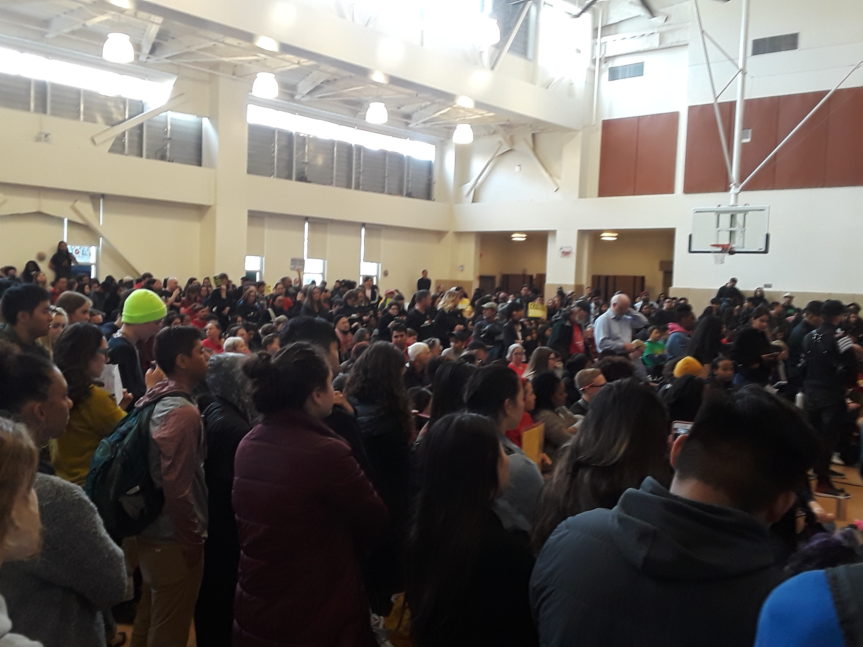It was a brutal OUSD board meeting. Hundreds of students lined the hall, fighting for the supports they needed amidst a proposed $22 million in cuts. They had lobbied, organized, and gotten at least one trustee, Director Hinton-Hodge, to agree with them to dip into the reserve and maintain some key programs. But it would not be.
To be fair, the Board majority felt compelled to cut these programs as part of what is needed to pay teachers more fairly, create better conditions at schools, and hopefully keep the district out of a takeover—where cuts would likely be worse.
There are no good options, and each option had its risk. Where the pie is only so big, a larger serving to one group means a smaller portion to another.
The student priorities got the child’s plate. The programs they needed, the ones they identified and fought for were on the chopping block. And the chop was coming. One of the first casualties in the strike settlement was student wellness, the second was equity, and third was their faith in the adults running the system.
You Are Either at the Table or on the Menu
Students aren’t around the table when the deal is cut. And they learned a painful and dirty lesson of politics—either you are at the table or on the menu—foster care managers, restorative justice, and support for Asian Pacific Islanders, were brunch at the bargaining table. As some of these groups and losers in the bargain realized it, they opposed the agreement, including the youth advocacy organization, AYPAL.
These are all programs that students identified as having real impact. And though the young people at times, spoke out of turn or maybe got out of line, their truths were undeniable. These programs mattered. But in the hierarchy of cuts they were vulnerable and were lost. This isn’t to blame the district or union, but to recognize how bargains are reached, and the structural flaw as it relates to schools. Further, many of the equity initiatives are housed in central administration, so “chop from the top” translates into, chops to equity in many cases.
I have written before about this process and unless we interrupt it—I will again (from last year).
This year is starting as the last one ended; with a parade of the equity horribles—first it was restorative justice, cuts to the program and elimination of school based staff, then it was slashing the growing Office of Equity, then, as school started we saw the wholesale elimination of sports, with girls’ sports bearing an unequal burden. And this week it’s a story about how the OUSD program that fed hungry children dinner was eliminated. Literally food being taken from the mouths of babes.
Many of these targeted programs are considered kind of add-ons or non-essentials, for reasons of history or ingrained bias. And equity is a newcomer to the educational scene, one that chatters a lot but has a small footprint. Equity also has less established constituencies—unless you count the underserved students and families. So, unless we interrupt this predictable cycle there will be more of the same to come.
We need to interrupt this by putting students and equity at the center of future bargaining, both literally and figuratively. We have more fights to come in Oakland, we can fight each other, or fight together. A fight that places equity and resources at the center can bring us together. There is nothing else that can.
Student Stories of Loss and a Harder Path Forward
A young woman in foster care crying as she exceeded her one minute of speaking time, bemoaning her lack of family and the loss of the staff, who was her “family” at school. The students sharing how restorative justice keeps them at school, keeps them safe, and has helped them grow. The powerful work coming from the folks at APISA, with Asian Pacific Islanders, a group that is often unseen and whose varied needs are unaddressed. They had boasted a 20% increase in graduation rates, but their program manager was being cut.
A parade of students talked about how “their voices were not included” or how “they were ignored” in negotiations.
In our troubling world of fighting for crumbs amidst golden skyscrapers. The adults got a crumb at least, the kids lost theirs.
There is more pain to come before relief. We do need more revenue in Oakland, which, among other things, means amending Prop 13. But we also need to address the district’s underlying structural issues, lack of equity and quality, and find a way to move forward together. We need to build trust, overcome divisions and fight for what we all deserve; an adequately funded, higher quality and more equitable public education system.
These bruising fights make it more difficult though.
As student director Yota Omosowho stated tearfully, “I have lost all faith or trust in this board right now,” said Omosowho, fighting back tears, after the vote as the meeting room erupted with cries of disbelief from frustrated students. “I honestly think we should not even be talking to them. Let’s take it to the state. Let’s take it to the county. Let’s take it to people who actually care about us because this board isn’t listening to us.”
And this was not lost on Director Harris or other trustees.
“I came here in deep conflict,” he said, adding that he was upset that different groups within the district were “fighting for resources.” He agreed with many speakers who said the district should seek more money from the state, but added: “Have we damaged the relationships so much that we can’t do that in partnership?”
We need to change who is around the table if we want to march together in unity for the resources and system our families deserve. I hope the district and union are listening. I know the youth are.

